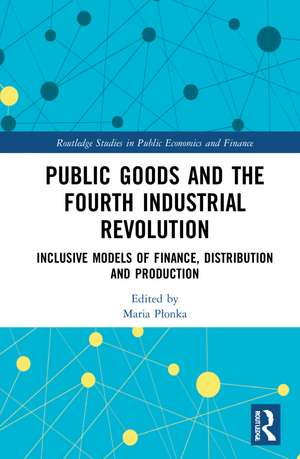Public Goods and the Fourth Industrial Revolution: Inclusive Models of Finance, Distribution and Production: Routledge Studies in Public Economics and Finance
Editat de Maria Płonkaen Limba Engleză Paperback – 29 ian 2024
| Toate formatele și edițiile | Preț | Express |
|---|---|---|
| Paperback (1) | 259.98 lei 6-8 săpt. | |
| Taylor & Francis – 29 ian 2024 | 259.98 lei 6-8 săpt. | |
| Hardback (1) | 1002.80 lei 6-8 săpt. | |
| Taylor & Francis – 15 iun 2022 | 1002.80 lei 6-8 săpt. |
Preț: 259.98 lei
Preț vechi: 326.49 lei
-20% Nou
Puncte Express: 390
Preț estimativ în valută:
49.75€ • 52.07$ • 41.41£
49.75€ • 52.07$ • 41.41£
Carte tipărită la comandă
Livrare economică 01-15 aprilie
Preluare comenzi: 021 569.72.76
Specificații
ISBN-13: 9781032229003
ISBN-10: 1032229004
Pagini: 272
Ilustrații: 70
Dimensiuni: 156 x 234 mm
Greutate: 0.45 kg
Ediția:1
Editura: Taylor & Francis
Colecția Routledge
Seria Routledge Studies in Public Economics and Finance
Locul publicării:Oxford, United Kingdom
ISBN-10: 1032229004
Pagini: 272
Ilustrații: 70
Dimensiuni: 156 x 234 mm
Greutate: 0.45 kg
Ediția:1
Editura: Taylor & Francis
Colecția Routledge
Seria Routledge Studies in Public Economics and Finance
Locul publicării:Oxford, United Kingdom
Public țintă
PostgraduateNotă biografică
Maria Płonka is Professor in the Department of Risk Management and Insurance, Cracow University of Economics, Poland.
Cuprins
Introduction 1. The fourth industrial revolution and contemporary technological, economic, and cultural megatrends 2. Public goods in economic and other social sciences 3. The impact of megatrends and the evolution of public goods 4. Health security as a public good in the era ofthe fourth industrial revolutionin Poland 5. Local public goods and public utility services in municipalities (urbanized areas)6. Challenges for the education system inthe era ofthe fourth industrial revolution7. Conclusion
Descriere
This book redefines the current paradigm of public goods in the era of the fourth industrial revolution. It proposes a model of production and distribution of public goods that acknowledges the participation of entities from the public, private, and nonprofit sectors.





